#and not ALL symptoms can be controlled-- specifically internal ones
Note
That last anon was uhhhhh very weird and mean to you. It's kinda funny how they use the word "symptoms"... Ah yes, symptoms. The one thing about illness that is completely under control of the ill. Their arguments were pretty garbage. Like saying that a cancer patient is economically abusive for requiring a lot of money for treatment.
Very weird of them, kinda think they were venting some trauma inappropriately and holding you responsible for some fucking reason.
-🦫
the funny thing is i too have trauma and yet don't attack random internet strangers over it lmao
but yeah it was so fucking out of nowhere. I *think* I can guess which post of mine ticked them off but the post was literally agreeing with them. With the fact that Cluster B Disorders are literally classified and diagnosed by unstable, toxic, and often abusive interpersonal patterns of behaviour. Same way any mental disorder is diagnosed; by a PATTERN OF BEHAVIOUR. And apparently they took that to mean that I think ADHD or something has the same symptoms as for example NPD even though I said literally the opposite. There is a reason we have these classifications and I know ALL TOO WELL what that anon was talking about regarding their trauma. But like. I'm not their therapist yk? It did actually tug at my heartstrings a bit because I do have a soft spot for rage fits out of misplaced Fear and whatnot about people not believing what happened to you and why. But like. Still deeply inappropriate. I'm not even mad at the anon really and I don't want to make fun of them either. I just hope they can get the help and support they need and maybe stay away from triggering themselves online before they're ready to calmly and accurately interpret posts and conversations about trauma-related topics.
In fact I myself stay far the fuck away from certain trauma triggers online even though I know I have a lot of light to shed on how it happens because it just isn't good for me. I will truly and legitimately block someone with even a blog colour theme that brings things back or a post even mentioning something that reminds me of what happened. Anon needs to take steps to heal with a private and stable support network and avoid triggers no matter how tempted they are to seek them out, because I know what that's like and it is actually very common with ptsd and c-ptsd. A lot of times people will consciously or subconsciously seek out triggers trying to find some sort of closure or vent their feelings; but all that giving into that urge does most of the time is make it harder to heal.
Mental illness symptoms being controllable is... a complicated subject. You CAN control them actually, at least some of them. For example I'm on the schizo spectrum. I cannot prevent hallucinations when they happen but I can have a plan of action so I don't freak anyone out or hurt anyone. Someone with NPD may have some kind of Ego Moment where they feel the need to assert that they are superior when they feel inferior but knowing about their disorder can actively decide not to do something potentially hurtful in the heat of the moment. Just like with physical illness, symptoms are manageable. Lots of physical ailments you cannot cure, but you can manage symptoms. Like the flu. You can't just. Unget the flu or "cure" it. Most of the time it passes on its own as long as you stay healthy. But what can you do? Treat and prevent symptoms. You can control symptoms and it is, unfortunately, your responsibility unless you are under someone else's care to control your own symptoms. If you are constantly ill and there is no cure, you must seek medicine if you want to feel better. If you have a mental illness and you find yourself struggling with yourself or others, you must seek support and figure out how to control and minimize the symptoms if you want to feel better. No one is obligated to be healthy but at the same time, you are responsible for your health no matter how unfair it is. Even if someone else injures you, they can pay settlement for hospital bills but YOU have to be the one to take meds and get treated. Same with mental illness. Mental illness literally cannot be your fault; it is usually genetic or from trauma. Guess what? It's still unfortunately your Responsibility to manage. A lot of people get stuck on where to place blame and expect the responsibility to go where they put the blame. But blame can go anywhere or nowhere and you will still be responsible for fixing what is wrong. The fact that I anger easy is not my FAULT. But it IS my responsibility to find safe and healthy ways to deal with that anger. Just because I'm not the one who made me angry does not give me the right to hit someone or start screaming my head off. Anyone who places too much weight on blame and treats symptoms as inevitable and unchangeable is liable to neglecting their responsibility to care for themselves.
#symptoms is specifically the one thing in illness you CAN control anon#usually not without help#and not ALL symptoms can be controlled-- specifically internal ones#i.e: you cannot control the internal symptom of envy but you can control the external symptom of breaking someone's things in a fit of rage#anon response#anyway#i hope my prev anon gets well needed support and takes some time off the web#and i hope that we all can take a little more responsibility#there are many things in life that are not our fault that we are responsible for#your life itself is not your fault and you are responsible for it once you reach age of majority#and in some ways sooner than that#your eating disorder because you were bullied? not your fault whatsoever#you are STILL responsible for getting help though#it isn't fair but it's the truth#i think a lot of people need to go back to the basics; responsibility; self-control; politeness; respect#we don't just need to teach this to children. we need for everyone to be taught again and again basic skills for how to interact with#with yourself and relationships and larger society
4 notes
·
View notes
Text
Something that always struck me about this 'fight' is that it felt really one-sided. Not because the Raven Beast is bigger, but because she's also way more aggressive. We see throughout the show that Eda in her Owl Beast form acts mostly on instinct (and her inner beast, once she starts talking to it, seems to just be hungry or cranky most of the time). We don't get much insight into how Lilith copes with the curse (like none at all after this), so this is going to be a lot of inference.
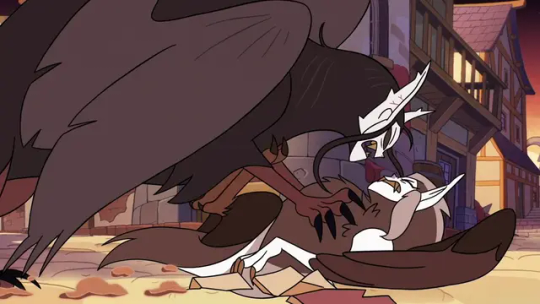
Off the top, I would like to reiterate that Hayley Wong has repeatedly asked that nobody repost or edit her art without permission. I'm going to be referring to stuff from the boards in this post, so here's the link if you want to look for yourself.
So, in this episode, Eda and Lilith are both angry—specifically at Gwendolyn, and with good reason. They both end up turning into beasts due to a combination of that anger, stress, and the fact their mom thought she was "helping" by taking away their medication.
But here is where they differ. Eda was angry about the current situation: her mom refusing to respect her choices, and causing unnecessary harm to her all day. And Luz even joined in. As Eda says, she has a right to be upset, though I don't think she meant to lose control over the beast.
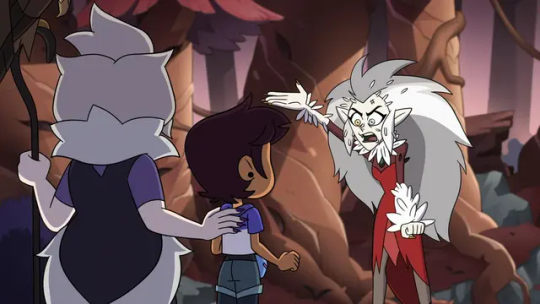
That's just what happens when she reaches her limit. And she knows her limits, she's been dealing with this curse for 30 years!
Meanwhile, Lilith has been dealing with the curse for... a few weeks, at most? Unless you count dealing with the guilt of cursing Eda as part of that. We see that she's quite unaware of the effects of the curse, as she experienced some symptoms for the first time this very day. She essentially gets told to take an elixir if she starts feeling stressed, and then is left in the house to stew in her guilt and insecurity all day.
Gwen's lukewarm greeting, and the realization that she's paid consistent visits to Eda over the years, is enough to send Lilith into a downward spiral. She starts stress-eating ice cream, and makes cruel comments about King's dad abandoning him (a clear case of projection, and I don't think he really internalizes it after this episode, but seriously that's no way to talk to your 8-year-old nephew), and unfortunately the only voice of reason around is Hooty. Well, he tried.

I want to note here that she doesn't cry. She mopes, she complains, she gets rude and cynical; these are all things we've seen her do before. But she doesn't allow herself to honestly express her feelings, her wants and needs. What's she gonna say? "Hey Mom, can you please pay attention to me?" You can't just ask for things like that. And she's a grown adult, she's more mature than this. She was the head of the Emperor's Coven, for Titan's sake. Didn't she get enough attention there to last a lifetime? And didn't she learn how to repress all her useless emotions and craft a perfect persona to hide behind until she could no longer tell the mask from her face?
She realizes she's indulged her worst thoughts a little too hard when the feathers start popping up, and goes to take an elixir and calm down...
And there are no elixirs.
And she panics. She has no coping strategies for this. She doesn't even know what's going to happen to her, only that it's going to be really, really bad.
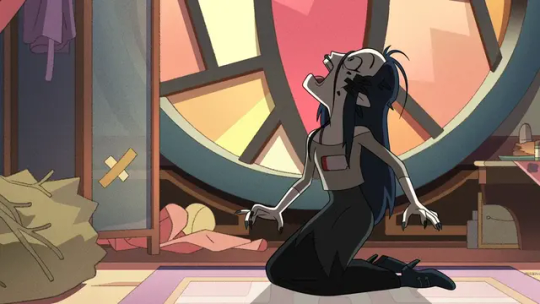
It has to be terrifying, and painful... and maybe, just a little bit deserved? This is the fate she forced upon Eda, after all.
We don't see any signs that she damaged the house after she turned, unlike the havoc Eda caused back in The Intruder. King runs to get help, because Eda or Luz would know what to do better than he does, and Raven Beast Lilith seems to pursue him, but she's not after him. She goes after Eda directly. There is no distraction (King also notes that light glyphs had no effect on her), there is no behaviour that can be explained as animal instinct. There is a violent, visceral anger, and instead of addressing its source, she flies out there to take it out on Eda.
This is why I don't buy the interpretation that Gwen started favouring Eda only after the curse. By that point, Lilith was an older teenager almost out of the house, and it's completely reasonable for the parents to be focusing more on the younger kid with a new mysterious illness. I think Eda was always the favourite, or at least got more attention in ways that made Lilith feel overlooked. Part of it was that Eda got in trouble more, whereas Lilith was usually quiet and well-behaved, so everyone just decided that Eda needed more help (which she didn't necessarily want) and Lilith needed none. Lilith got very good at needing nothing. So good that instead of talking to her sister about their impending duel, she decided to curse her in the dead of night instead. And then to keep it a secret until she found a way to undo it, because she never wants to upset anyone or cause a scene. And then to give 30 years of her life to an evil man's crooked system for nothing—less than nothing, she's only going to realize later.
Lilith's breakdown isn't about the fact Gwen is paying attention to Eda again. That's just the trigger for a lifetime of repressed emotions bursting to the surface all at once, and it's been coming for a while.
The Owl Beast seems to be mostly defending herself. At a few points she tries to flee, but the Raven Beast catches her. The Raven Beast is malicious, with exaggerated expressions of rage and what can only be described as cruel glee when she inflicts pain. This seems to come out of nowhere... but only if you haven't been paying attention to Lilith.
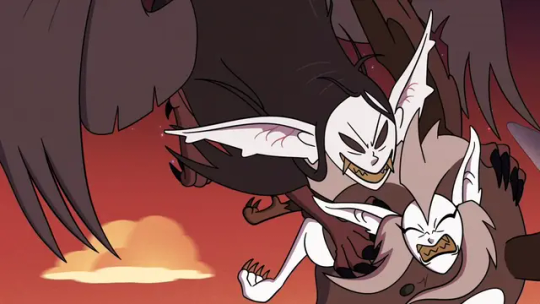
We know what Lilith is like at her worst. It wasn't even that long ago she threatened Luz's life in order to capture Eda. All while convinced that she was doing the right thing. She doesn't even have that shield now. She doesn't have much of anything, really, except her sister who refused to leave her out in the cold even after everything she's done. And this is how she repays that trust...?
We also know that Lilith wasn't in control of her actions as the Raven Beast. But that doesn't mean the beast was just doing beast things. I believe it was acting directly on Lilith's intrusive thoughts. Hurting Eda was her greatest shame, and the idea that she could do it again is a constant fear that she has. Unlike Eda, who has long been seen by others as a monster and had to fight her internalized shame about it, Lilith considers herself a monster while everyone around her is unaware of her inner turmoil. She's afraid of herself; she thinks her feelings are ugly and violent and unmanageable. And so that's what they became.
There was a sequence in the storyboards that was cut from the episode, presumably for time, where Gwendolyn tries to use a beastkeeping spell in order to communicate with her beast-daughters. It proves completely ineffective, so she goes to plan B, which is just trying to talk to them like a normal person (also in the boards, Gwen summons firebees to lift roof tiles for her to walk on, which I'm glad got changed to the tiles themselves being flying creatures. it's less distracting). There was something really affecting about watching her try to do things her own way one last time before finally admitting that she's failed the both of them. It painted the picture of this whole family who never talk about anything that's difficult or painful.
Then the scene plays out the way it does: Gwen's words get through to Eda, and allow her to finally face the beast and have an important revelation about herself.
And Lilith? Well, for all the violence she just showed, she breaks down in tears the second she is shown loving care.
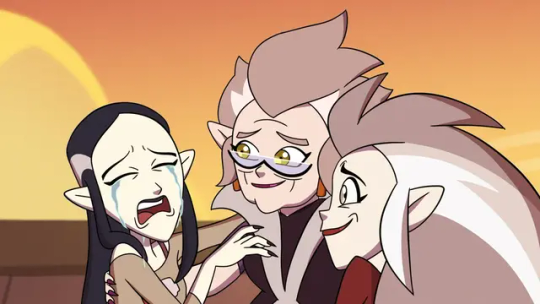
When they've changed back, her anger is gone. There is no sign of the monster; there is only a sad, lonely woman who hasn't allowed herself to cry in so long that she almost forgot how. But she's safe now, and she's seen, and she's allowed this healthy expression of emotion. She collapses in the arms of her mother and sister.
After this, Lilith and Gwen had an off-screen conversation, where Lilith admitted she was the one to curse Eda, and decided that she was going to move back home. I could write a whole other post on that first point, but we've reached the end of the episode. I think a major reason why Lilith wanted to stay with mom and dad instead of with Eda is because she's afraid of hurting Eda again. Any time the curse acts up, she becomes a danger to the people around her, but especially to Eda, because of how much of her energy and guilt and shame has been focused around Eda over the years. She needs some time away while she figures out how to deal with the curse, to recover and build up her own identity. And of course, to build the relationship with her parents that she needed as a kid. Better late than never.
117 notes
·
View notes
Note
Can you talk a little bit about crossovers in ASPD, ADHD, and Austism?
there's honestly a lot. having autism/adhd put u at a higher risk for childhood abuse and neglect and the specific ways that autistic in particular but adhd kids as well get mistreated and abused are very likely to cause cluster b disorders which is one probable reason for the amount of overlap and comorbidity between the three
for aspd in particular some of the overlapping symptoms are things like:
low distress tolerence
low overstimulation threshold
chronic understimulation/boredom
perseveration on specific thoughts or feelings
demand avoidance/ pathological demand avoidance
oppositional defiance/rejection of outside control and influence
valuing ones own internal sense of logic and understanding over outside influence
rejection of societal and social norms
impulsivity and difficulty not acting on impulses
difficulty with delayed gratification
empathy dysfunction
decision paralysis/ analysis paralysis
maladaptive daydreaming
dissasociation
struggles with anger, irritability, and aggression
executive dysfunction
thats all the ones i can think of rn but this is by no means an exaughstive or comprehensive list. and even within each of those bullet points there's absolutely like, micro lists underneath them of how each of those things presents in a practical manner and the thought processes behind them
for example executive dysfunction, this is often viewed as "irresponsibility" or lack of caring/understanding and is weaponized differently for each. autistic ppl often get infantalized and viewed as too unintelligent or incompitent to understand what to do, while ppl with adhd are viewed as selfishly lazy and not trying hard enough, and then ppl with aspd are viewed as maliciously and purposefully not doing tasks to hurt others. when in reality, all of it stems from the inability to properly order and execute specific tasks in specific ways under specific time constraints without any kind of accomodation
aspd lists a vague and unspecific "biological component" that is required for the disorder to manifest alongside trauma, which lots of people have taken to mean that aspd has some inherent "asshole gene" where ur just born a piece of shit but in realy the "biological component" is nuerodiversity. aspd is the result of prolonged childhood trauma on a nuerodivergent brain. and the most common form of nuerodivergency is autism, with adhd a close second (mostly because in reality these two exist on the same spectrum and are not two distinct things but more like different points on the same graph)
so these things are much less three distinct and completely different catagories and more like a venn diagram that is practically a circle and therefore share a ton of overlap
i hope that was helpful and please feel free to come back and ask more if u want me to expound on any of these points or go into more detail about specific symptoms or similarities
#jack.speaks#anon#aspd#aspd safe#actually autistic#adhd#actually adhd#neurodivergent#nuerodiversity#cluster b#cluster b pd#actually aspd#actually antisocial#aspd tag#autism
33 notes
·
View notes
Text
apparently i haven't been loud enough about palestine on this sideblog at all, because i already had to block one of those liberal zionists that was following me and liking my posts while only ever reblogging from "nooo i'm not a zionist i swear, i just hate palestinians for totally unrelated reasons" types. so, for the sake of complete clarity about my stance, here are some excerpts from decolonizepalestine.com about the myth of the two-state solution:
"What this approach to a solution neglects, is that Israel is not a normal state. It is a settler colony [You can read more about this here]. We are not talking about two naturally occurring populations which have a land dispute. Israelis are descended from settlers that arrived from abroad with the goal of erecting an ethnocratic settler state in an area that was already home to the Palestinians."
"This approach is also inadequate to right historical wrongs, as it focuses on the pre-1967 borders as a starting point, which are in themselves a product of this colonization, and not the root cause of it. It is thus preoccupied with finding solutions to symptoms, rather than dare address the root cause, which is Zionist settler colonialism and the ethnic cleansing of Palestinians."
"All of these shortcomings are often countered with the assertion that Palestinians must compromise to reach peace. Israeli control is treated as a fait accompli and that Palestinians must deal with it, rather than ask for justice. This is the whole premise of the two-state solution, that Palestinians must compromise on their rights to be granted a small, powerless sham of a state in part of their homeland. Israel, of course was not asked to compromise on anything substantial. The only compromise asked of Israelis is to stop its violation of international law, which it should cease regardless of any negotiation with the Palestinians. This attitude basically boils down to “what’s mine is mine, and what’s yours is negotiable.”."
"Has it never once sounded suspicious to you how Israelis focus on the number of “peace offers” that were refused by the Palestinians, but never once discussed the actual parameters or substance in detail? Because when these parameters are discussed, it becomes clear that these are terms nobody could accept. So even when Palestinians accepted the 1967 borders, a very limited return of refugees, and other compromises, this was still not good enough for Israel that sought to shrink the Palestinian Bantustan even further. These arrangements seek to formalize the status quo with cosmetic changes. Netanyahu promised that no Palestinian state will emerge, and in the case of any limited self-rule arrangement for the Palestinians, he spoke about a permanent IDF presence in the West Bank, as well as Israeli control of the borders and airspace. These are the amazing “opportunities” that Palestinians have been declining, and as a result are being painted as warmongering rejectionists for doing so."
"It should be mentioned that such arrangements were also concocted for the various Bantustans in Apartheid South Africa. What all of these arrangements have in common, is that they are designed specifically to dance around settler colonialism, and to try and find a “solution” comfortable for the settlers which do not harm any expansionist ambitions. In this way Palestinians are pushed to compromise until there is nothing left to compromise on, they are now even being pushed to compromise on having actual borders."
"That we barely ever hear about the offers that the Yishuv/Israel rejected should be an indicator of the nature of mainstream discussions on Palestine and the silencing of Palestinian voices. The Palestinian Liberation Organization also called for establishing a secular, democratic unitary state for all its citizens. Naturally, none of these proposals included genocide, ethnic cleansing or mass murder."
"Underlying the logic of both of these approaches are racist assumptions that the colonized are barbaric, bloodthirsty and ruthless. It is a deeply dehumanizing logic, steeped in every colonial and Orientalist trope. The idea that a decolonized, free Palestine would inevitably lead to genocide comes from this same logic. As a matter of fact, for all the claims of the Palestinians wanting to push Israelis into the sea, only the opposite has occurred in reality."
#cozy speaks#liberal zionism is still zionism babes!!!#palestine#my stance has always been clear and i have no fuckin clue why people keep missing that#free palestine isn't a metaphor yall get that right??#on a more pleasant note: i love the sweet lil palestinian tete that's the mascot of decolonizepalestine
12 notes
·
View notes
Text
if i have to keep saying it every single day until it gets through to people, i will:
people need hobbies. you, specifically, need to have hobbies. socially, emotionally, and psychologically, you need to do things just because you want to.
(CW: some discussion of the psychology behind disordered eating.)
when people talk about extreme burnout, when people talk about mid-life crises, the mistake they make is in assuming those are different things.
when a 20 or 30-something entrepreneur or influencer starts experiencing the productivity paralysis associated with burnout, that is not different from when a 50 or 60-something mid-level manager at a tech company starts experiencing the anxiety and restlessness associated with a mid-life crisis. the symptoms might look different, but when you peer deeper into the underlying issue that's causing them, the psychological distress these people are experiencing becomes indistinguishable.
it's a form of starvation.
"there is nothing in my life for me."
your job is not for you. your profit is not for you. your hustle is not for you.
these things are for your financial security, your sense of status in your community, your feelings of achievement and self-worth. and that's fine. those are all good and necessary things.
but they're not for you, because you are not the work you do or the money you make or the people who admire you.
you are the quiet, strange, harmless little urges that strike you in those moments when you are left alone with yourself.
you are the you who once alphabetized your friend's DVD collection, completely unprompted. you are the you who once spent three hours on a single level of tony hawk's pro-skater trying to see how badly you could bug out the map. you are the you who doodled in the margins of your high school notebooks even though you never thought of yourself as a particularly good artist.
you're not a machine. you're a weird little animal called a human being, and sometimes, you will need to do silly little things that other people might not understand.
preventing yourself from doing so is a form of self-harm.
a person who has begun to recognize that their life is completely absent of pointlessly joyous things becomes an animal that has realized it is caged without understanding what the cage is.
they feel restless and listless and like something terribly important is missing or needs to be done, and they usually can't explain why, because getting to that point requires you to go all in on the idea that uselessness is the same as worthlessness.
that there is no space in your life for pointless things. that everything needs to have some form of value in how it serves your goals.
treating things that way turns every hobby into a hustle, even if money never changes hands.
you start treating everything like a job.
and that can ruin you. it can make you incapable of understanding how to engage with the things you enjoy just to enjoy them.
everything starts getting weighed on this internal scale of functional use and valued accordingly, and that leaves very little room for things that bring you joy and nothing else.
it's an incredibly hard mindset to unlearn, and i have some suspicions that the damage it does to your mind might not be completely reversible.
i used to struggle with disordered eating.
there are elements to the grind culture mindset that are frighteningly familiar to me. the attitude towards self-deprivation is the same. it's exactly the same. it's like a self-deprivation mad libs: swap a couple words out and you can't tell what it started out as, because it could be either.
and i think that's because when you deprive yourself of things that you have decided are not strictly necessary, it can make you feel powerful. accomplished.
and yes, it can be hard. it can be punishing. but that specifically is what gives the illusion of having achieved some sort of control.
there's this thought of it being your body, your life, and now you are one step closer to shaping it into your version of perfection.
but that's never going to happen. there isn't an end point. there won't come a day when you are satisfied with what you've achieved.
because it and you are not becoming anything.
all you're doing is starving yourself.
and if you do it long enough, there's a chance you're going to spend the rest of your life relearning how to chew. a very real chance that you will never be normal again. that you will never truly be free again.
that those thoughts may slowly diminish, may fade into the background, but will never truly leave you. that they'll catch you off guard, even years later, in moments where you truly believed you were done getting better.
sure, you can technically live on the bare minimum. but what's the fucking point? what does it achieve, in the end?
what does it get you that's worth what it cost you?
fuck grind culture.
the hobby is mandatory.
i don't care if it's crochet or cooking or pointillism or pressing flowers. i don't care if you're laying out every pencil you own in order of length in a line on the floor or creating an elaborate rube goldberg machine with household items.
take up scrapbooking. play trashy dating sims. write trashy romance novels and jumpscare your family with them when you die.
write fanfiction. make a blog dedicated to roleplaying as a bog witch.
i don't care.
i don't care what you're doing. all that matters is that you're doing it because it seems like it would be fun or satisfying to do, and that's it.
you need hobbies. it doesn't matter what they look like.
but you need hobbies.
#CW disordered eating#disordered eating mention#grind culture#the goblincore people have it right#collect rocks#scream at the moon#for the love of god just let yourself enjoy things
14 notes
·
View notes
Text
Another day, another anti-endo crosstagging hate and misinformation into pro-endo tags
Okay, let's go. To start off with, I do not normally like posting endogenic content in DID and OSDD tags, but at this point, I feel it's necessary. @constellation-archives was politely asked by @ecosystim to remove the pro-endo tags from their post. This was their response:

By this same logic, it would be irresponsible to allow their misinformation to go uncorrected in the tags they shared it in. So I will be posting my rebuttal in every tag Constellation-Archives tagged in their original post. If you do not like seeing this type of content in the DID and OSDD tags, please request that @constellation-archives cease crosstagging with pro endo tags. Thank you. 😁
Now, onto their post.

First, if we're going to have a conversation about endogenic systems, we need to actually define what a "system" is. With the broadest definition, a "system" consists of all of biological human's personalities and subpersonalities, as seen in internal family systems.
The way system is being used here is in reference to something more specific, which we'll call a "plural" or "multiple" systems. Or, what a psychologist might describe as "system of dissociated parts." All of these are functionally the same thing, whether a system's members identify as parts, people, alters or headmates.
As a general rule, each headmate in a plural system must be both autonomous (able to act outside the host's control) and self-conscious (having a sense of self and identity.) That seems like a pretty straight-forward definition that we should be able to agree on.

Now, there are a few things to know about the theory of structural dissociation.
It's a theory. It's not confirmed, and psychology is riddled with theories that were later disproven. See most of what was written by Freud. While it contains some truth, it should not be blindly taken as fact. One of the claims made by this theory, as I understand, is that systems with OSDD will only have one ANP (a non-trauma-holder.) This contradicts the experiences of many OSDD systems.
The data that it's based on isn't substantial. There is a lot of research into DID, but next to none into OSDD. There is a growing body of research into endogenic systems but most of it happened AFTER The Haunted Self was written. It's likely that ongoing research will challenge various aspects of this theory in coming years, with the science of multiplicity quickly evolving.
Most importantly though, the authors of the theory of structural dissociation do not endorse the claims constellation-archives is trying to tell you they do.
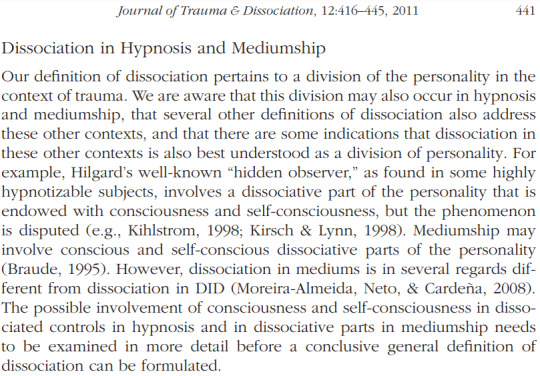
The above is a paper where they acknowledge that spirits communicated with by mediums and states created in hypnotized subjects may be experiences of self-conscious dissociated parts of the personality. This would, by the previous definitions of systemhood, be an endogenic plural/multiple system.
Endogenic systems are directly acknowledged as possibe by the creators of the theory of structural dissociation.

I feel like 1 and 3 could have been combined into a single point. Regardless, this claim doesn't make much sense. Most endogenic systems are not claiming to have DID or OSDD. Importantly, while someone can cause themselves to gain symptoms of a disorder psychologically, they still have those symptoms. If someone thinks they have an illness that gives them a rash, the rash is real, even if the illness isn't.
One might convince themselves they have Tourette's and experience tics. In this case, whether the Tourette's is real or not, the Tics are.
If multiplicity is a symptom that's generated due to psychological reasons, the multiplicity is still real. It's not fake multiplicity.
Regarding number 2, a growing number of psychologists are recognizing that voices experienced in psychotic disorders are also dissociated parts of systems, that are autonomous and conscious enough to respond to psychotherapy. And these dissociated agents are not always caused by trauma.
Based on recent research, some DID specialists have made the case that voice hearers with Schizophrenia are experiencing a dissociative subtype of the disorder, and that the acknowledgment of the dissociative symptoms is integral to successful treatment.
After this, they then go on to try to convince people that endogenic systems are dangerous and that our existences are harmful. I'm not going to address these claims as they aren't scientific and have nothing to back them up besides anecdotes. There are harmful individuals in any group, and their claims of demonizing persecutors or pushing system hopping have also been done by traumagenic systems, as is the belief in alter death. (In fact, it being called "alter death" should be a tip off that it's not an endogenic thing, given that many endogenic systems don't like the term "alter." And you don't see people calling it a "headmate" death.)
Again, I don't want to be posting syscourse stuff in the traumagenic and OSDD/DID tags. But unfortunately, many members of the anti-endo hate movement have decided that endogenic systems cannot have safe spaces to exist, and they invade our tags with lies, hate and misinformation, not caring how many people they hurt in the process.
I see no other alternative than to crosstag my rebuttal to the same exact tags in an effort to correct their misinformation. If you don't want my responses to these posts in these tags anymore, please ask @constellation-archives to not post their misinformation in the endogenic and plural tags anymore. If they remove the pro endo tags from the original post, I'll remove the DID and traumagenic tags from this one. Until then, this rebuttal will use the same exact tags as they used so that the people who saw their misinformation can read this, with links to actual academic sources.
#did#anti endo system#anti endo#anti endogenic#endos aren't real#endos are bad#traumagenic did#system stuff#plural#didosdd#actually traumagenic#fuck endos#info#system info#structural dissociation#pro endo#endo system#endogenic#syscourse#syscource
140 notes
·
View notes
Note
(about the dream bbq post) aren’t daturas like… the worst hallucinogen known to man? Known to give people horrifying trips with effects that linger for months/years? I wonder if that’s significant. I saw someone else point out the fork frog guy looks like a mad cow disease prion, + the spirals in the ballerina scene and the paper streamers also resemble prions. Both these things feel similarly related to losing one’s mind.
Ayo, you’re onto something!!!
This is an ask I recieved relating to my first ENA: Dream BBQ analysis I posted! Be sure to check that out if you haven’t already! I definitely plan to write more up ;p
Let’s look into what Mabel (I shall call this user such based on the first part of their username) brought up~!
Make Me Delirious
Daturas are a hallucinogen, more specifically a deliriant. Here are summaries about deliriants and delirium I found from Wikipedia
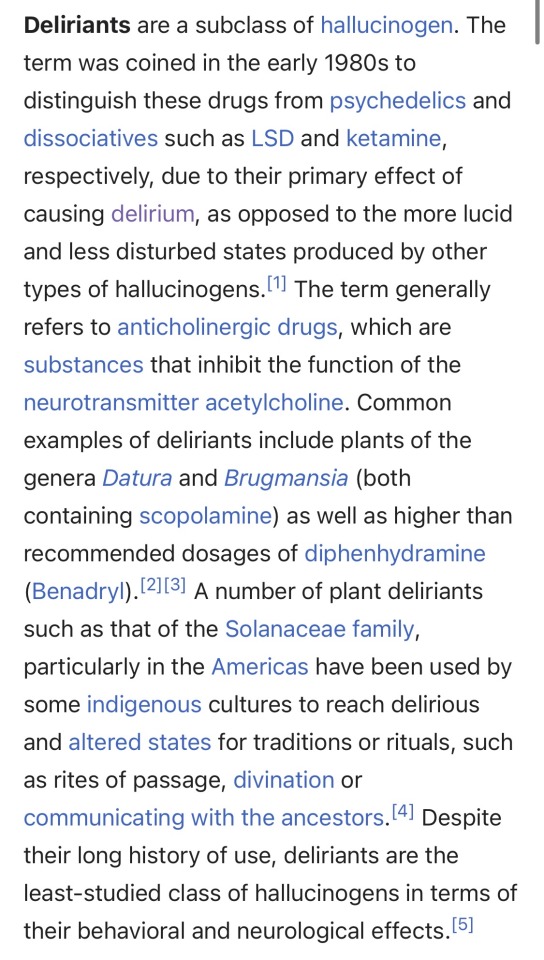
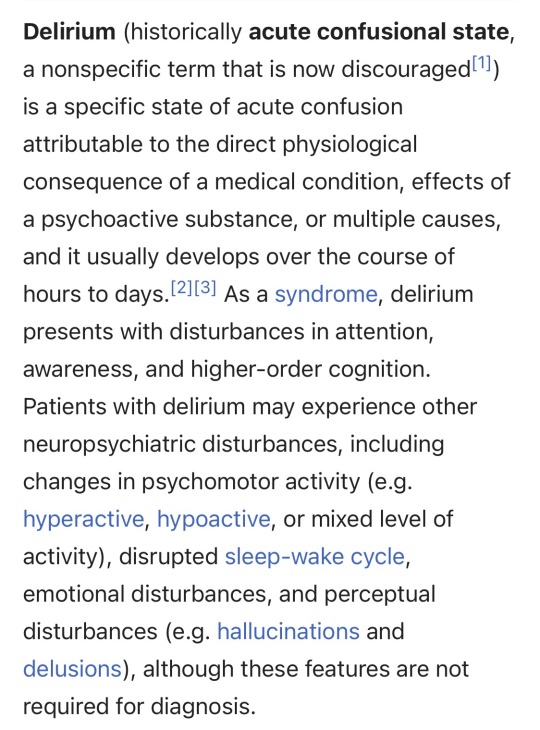
Already, we can see some fascinating points being brought up.
Deliriants inhibit the neurotransmitter acetylcholine, which is a key part of the autonomic nervous system (aka, how our body and brain react to our surroundings). It’s an internal transmitter in the sympathetic nervous system (which is responsible for the fight-or-flight response), and the primary neurotransmitter/final product of the parasympathetic nervous system (which helps you calm down and bring your body back to normal). It’s primary function is activating muscles… so shutting that down is pretty dangerous (especially in high doses).
Deliriants are known for causing… delirium (what a shocker lol). Delirium causes psychomotor changes (hyperactivity/hypoactivity/mixed), emotional and perceptual disturbances (such as hallucinations and delusions), and disrupt sleep-wake cycles.
Most plant deliriants are part of the Solanaceae/Nightshade family, which include plants such ad belladonna/deadly nightshade, and brugsmania/angel’s trumpets. Arguably, the flowers in the trailer also look like brugsmania… but whether they’re brugsmania or datura, they’re both deliriant flowers, so all of this still applies.



These plants have historically been used by indigenous cultures in the Americas (likely in extremely small doses) for assistance in traditions/rituals involving altered states. Such rituals involve communicating with ancestors, divination, and rites of passage, and are always used under supervision of a Shaman.
Prion for Info
First and foremost, what the heck is a prion?
In case you haven’t taken biology yet, or forgotten those lessons from high school, the brain has a lot of normal cell proteins called prion proteins. They're an important part of our brain function... though we're still figuring out their specific purpose. Normal prion proteins look like this (pictures are from this video):

However, there are also misfolded, abnormal prions that look like this:
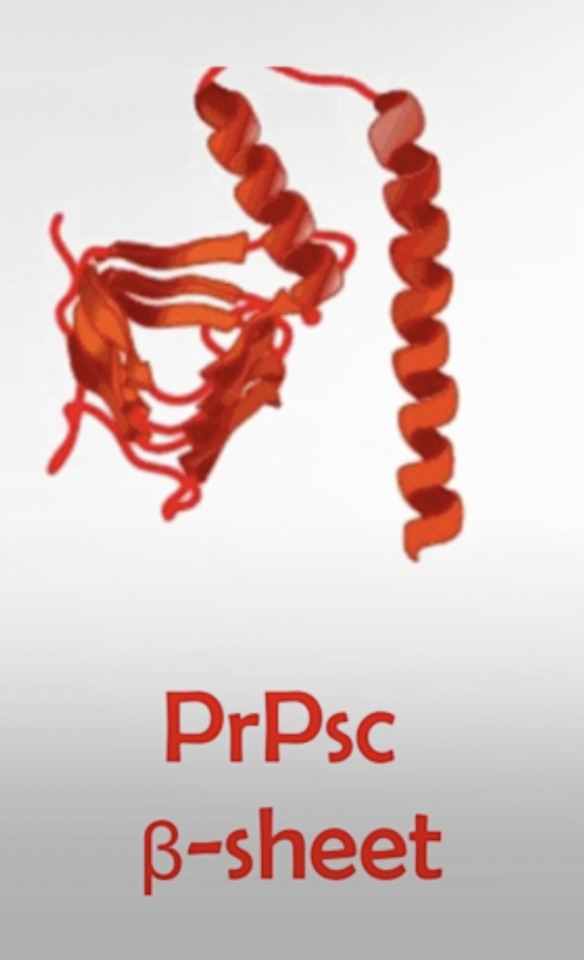
These are usually referred to simply as "prions" (we specify the normal, healthy ones as prion proteins), and they're able to spread their abnormal/misfolded structure onto the normal variants of the prion protein. This chain reaction is a major causative of neurodegenerative disorders, primarily via spongificatioxn of the brain (destroying the brain's gray matter). This can lead to severe symptoms such as rapid dementia, ataxia (loss of limb control), and insomnia. Once the disease starts, it's incredibly rapid and always fatal.
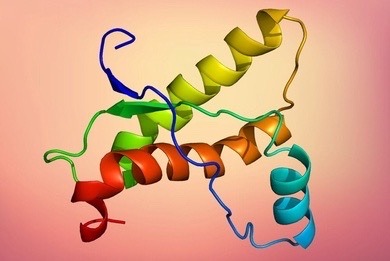
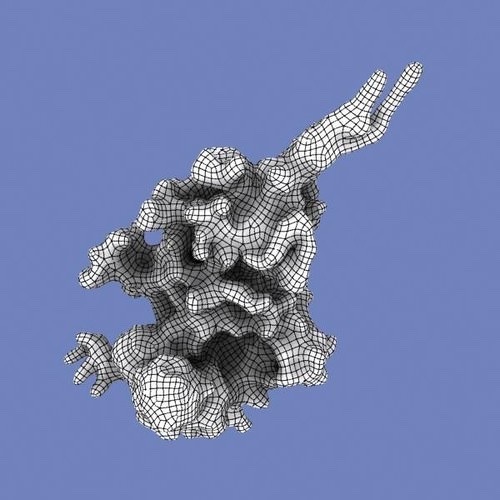
One of these neurodegenerative disorders that is especially prominent is Bovine Spongiform Encephalopathy, also known as BSE or Mad Cow disease. As the names suggest, this disease primarily harms cattle... but humans are able to become infected by it.
How? By consuming contaminated beef.
What do you usually eat at a barbecue?
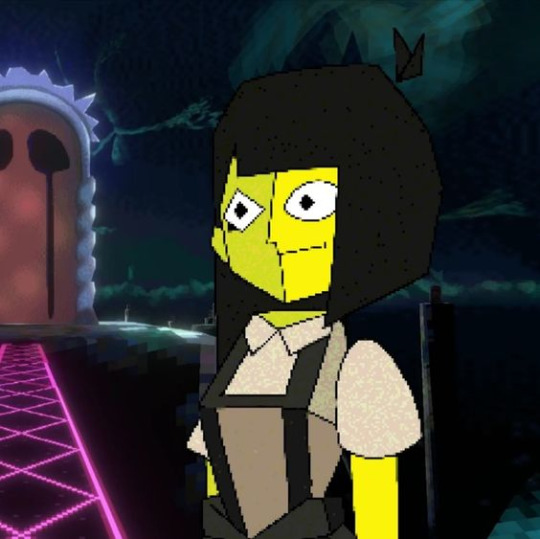
"Where is my mind" by the Pixies at full blast
In all seriousness, all of these connections to literally losing your mind and dying from madness are all very concerning. BBQ!ENA is going to go through so much more (as if the two other forms of her didn't allude to that already), and I'm very worried about her.
#ENA#ena joel g#ENA: Dream BBQ#Dream BBQ Spoilers#I'm definitely planning to do another post about the new voice reveals as well#stay tuned for that!!
12 notes
·
View notes
Text
Something I have noticed in the anime community, specifically amongst Naruto fans, is that criticism about a story’s message is usually rebuked with excuses based on the story’s world building and lore. So let’s just establish now that fictional characters do not have agency, everything that happens in a story is a conscious choice by the writer. When there is an in-universe justification for what happens, it is also a reflection of the creator who wrote that justification into existence. That gets overlooked more than you would think. Every human being has biases whether they're aware of them or not. So when consuming a piece of fiction it's important to ask
- What is the author trying to say?
- What could the author not realize they’re saying?
Naruto is a very interesting case for me. I love it to pieces, but I can go on criticizing it just as long as I can sing it praises.
It's a series that, right off the bat, introduces strong political themes. The way Naruto is treated is a symptom of the greater shinobi system and the way Hiruzen chooses to rule Konoha. It's presented as cruel and unfair to discriminate against a child for something out of their control. And while Hiruzen is the most powerful person in Konoha and one of the most politically powerful people in the world, we’re shown over and over how he offers almost no help for Naruto, financially, socially, and emotionally. A similar case can be made for Sasuke, who does have better living conditions (probably from being the only one left to inherit the clan’s wealth) but raises himself as a child and is also isolated. This is all established as a problem and unjust, but no blame is put on Hiruzen, who remains a hero in the narrative during the entire story.
This becomes a recurring pattern in Naruto. A systemic injustice is presented to the audience, but many of the guilty characters are rarely condemned by the plot, and in the instances that they are, they’re not condemned by the narrative itself.
Here’s an example.
Sasuke’s clan is killed in a massacre carried out by his brother. This injustice leads him to seek revenge. This revenge is dangerous and self destructive since he is relying on Orochimaru and cutting ties with all his friends/allies. But the narrative sympathizes with him via Naruto’s emotions, and he’s not portrayed as a villain for anything that happens in the Sasuke Retrieval arc. He’s righting a wrong.
He kills Itachi, who’s an international terrorist, only to find out that the massacre was orchestrated by Konaha, using Itachi as the fallman to hide behind. Danzo is portrayed as a villain several times, the abuse of his ambu like Sai, the collection of sharingan’s on his arm etc… This leads the audience to root more for Sasuke when he kills Danzo. However, this is where the narrative turns against him.
Sasuke comes to the conclusion that has been supported by the text for hundreds of episodes, across several arcs: the shinobi system is fundamentally flawed and is the catalyst for corruption and strife across the world. But when Sasuke challenges this system, he’s written as an extremist and almost cartoonishly evil in his attempt at abolishing it. This portrayal isn’t problematic in itself, it pertains to real life. There are victims of corrupt systems who discard their morals in the name of a greater good. But people are not a monolith, and when you only portray victims of these systems in one way, the most disagreeable way, you also open a floodgate to defend the corrupt system in question and justify its actions, while reducing its victims to simply deranged troublemakers.
For comparison, Avatar: The Last Airbender does a good job at showing the diverse reactions to corruption. Just take a look at Katara and Jet, both victims to the Fire Nation’s war crimes and filled with anger, but Katara fights to keep her morals and defends innocent Fire Nation civilians while Jet discards them in the name of justice.
In Naruto, almost every character who radically challenges the shinobi system is portrayed as a villain, then imprisoned or killed. At the same time, many of the perpetrators are justified in their actions by comparison to the emotional, violent avengers.
The Elders who encourage and conspire with Danzo to carry out the Uchiha massacre remain untouched and unconfronted for the remainder of the series.
Orochimaru, who committed some of the worst atrocities to citizens of Konoha and other villages, is turned into a comic relief character and rehabilitated into society in Boruto after a surveillance period in Naruto Shippuden.
Neji’s uncle is repainted as a wholesome grandfather while the nephew he owned died protecting his masters.
The shinobi system, a political and economic system that runs the entire planet and profits off of blood, continues on after the war ends. The human trafficking of kekkei genkai, the dehumanization of shinobi in the anbu, civilians dying in war, the discrimination and ownership of jinchuriki, children dying in the chunin exams, nations ownership of the tailed beast raising tensions for war. Every single problem in Naruto is attributable to this system in some way, and yet every character that attempts to radically question it is vilified, unless they concede and assimilate with the system, in which case they are “redeemed”.
What are Kishimoto’s intentions here? Why is it that the world and system he criticizes so often ends up unchanged and rewarded while the victims of it are punished? Why is there only one archetype of victim, one that is always painted as irrational and consumed with revenge, minimizing their legitimate complaints with the system? There is a pattern in Naruto where the corruption of the shinobi system that created the villain in the first place, is always overshadowed by that villain's crimes in response. Nagato’s family and friends are killed by shinobi during Konoha’s war, and so he retaliates by wiping out the entire village. Sasuke’s clan is exterminated in an organized genocide within the village, so Sasuke declares to kill every single Kage and rule over the world alone. Obito is nearly killed fighting as a child soldier, only to insight a world war later as an adult. Characters who challenge the system without violence, like the White Fang, are dead, and die without creating any real change in that system (missions are still prioritized over lives). It's also alarming that almost every villain who started as a victim to the shinobi system must die to be forgiven by the narrative. Again, characters like the Konoha Council, Hiruzen and Hizashi are never given this treatment by the story. In the case where Hiruzen dies twice, both times he’s presented as a hero.
So only people in high positions of power from Konoha are given rewards and no accountability. And nearly every crime by the villains are attacks on Konoha in some shape or form. Naruto is our guide in how we perceive other characters and this world, it's his emotions that set the tone of the show and get the thematic messages across. When Naruto forgives a character the narrative shines them in a gentler light. Gaara, who was terrifying before he became friends with Naruto, was like a walking doomsday bomb strolling the village and ready to kill off any one of our beloved characters. But because his childhood mirror’s Naruto’s and Naruto recognizes that, he quickly becomes an ally to Naruto and Konoha and much more friendly as a character. His relationship with his siblings and position as the baby brother is fleshed out and makes him seem a lot more empathetic. The next time we see him is in Shippuden where he plays Princess Peach as Naruto and dozens of characters rush to save him from his abductors.
Who Naruto does and does not empathizes with is imperative to who we are also meant to empathize with. And we all know he has a track record for trying to have heart to hearts with villains. That gives us two conflicting ways of understanding the story and the moral standing of villainous characters: 1. Naruto’s emotions, or 2. Consequences in the narrative.
There’s a hundred and one ways of looking at this story and trying to give reason to its convoluted political messaging. Kishimoto released chapters weekly, as is the standard in shonen manga, and maybe this confusion is a matter of tight deadlines, rushed writing and disorganization that can come with serialized manga in Shonen Jump. Considering the amount of retcons and Shippuden’s messy ending, it’s not a reach to say messaging might have been scrambled or put on the back burner to prioritize other parts of writing.
Two. The more problematic interpretation can be that Kishimoto wanted to tell a story where radicals are condemned, and while the system they live under may be flawed, it is always better to change that system in a peaceful way from within (see Naruto becoming Hokage) than to dismantle it entirely.
#what kishimoto was intending idk#all ik is i can’t stand the last of reading comprehension when it comes to uchiha stuff#naruto meta#naruto#naruto shippuden#uchiha#masashi kishimoto#mine
6 notes
·
View notes
Text
I'm so tired of seeing the word gaslight used incorrectly. Lately it seems the disability community has latched on to that word when anyone doesn't believe your diagnosis and symptoms.
That's not what it means. The specific definition is as follows:
Gaslight: manipulate (someone) using psychological methods into questioning their own sanity or powers of reasoning.
Way too many people define gaslighting as "denying someone's reality" and completely omitting that it is a manipulation tactic, which is pretty much always an interpersonal relationship and not a stranger, acquaintance, or doctor not taking your claims seriously.
When someone denies the reality of your disability, that's ableism. They genuinely don't believe you. They aren't trying to manipulate you, they are just applying their ableist biases and choosing not to believe you. It's not denying your reality it's denying your claim.
Also for the love of God you can't gaslight yourself. If you struggle to accept your own disability, that is denial and internalized ableism, not gaslighting. You can't manipulate yourself as this tactic requires.
Furthermore, in the classic movie Gaslight, the husband purposefully made his wife think she WAS going mad, not to deny real psychiatric symptoms. In many relationships the goal to convince someone their crazy is to control them. In the case of the movie it was to steal an inheritance.
Gaslighting is not so easily spotted and it is not simply a lie or denial. It's manipulation, it's abuse. And that's why it drives me up a wall that people use the word to just mean a disagreement. Gaslighting is a tactic in many abusive relationships, and it can be so hard to see what's happening to you. This is why it's so important that the word gaslighting exists and means what it means. Can we not belittle what abuse victims go through?
Can we stop throwing around the word and muddying what it means when abuse survivors need this word for a specific kind of abusive situation? To be clear, if this word wasn't about a type of abuse, I wouldn't care at all about it's incorrect use.
Lastly, you don't need to use gaslight to make your experience seem worse. Ableism and internal ableism are bad and serious enough and deserve sympathy. Being abused by gaslighting or abuse of disability by ableism (such as forcing a disabled person to work or denial of medical care for example) are both equally terrible and equally abuse.
No one's denying your reality when they don't believe you, otherwise every disagreement ever is gaslighting.
I won't die on this hill but I still intend to fight the battle.
12 notes
·
View notes
Text
This post is going to serve the purpose of stating what I know I experience, with regards to "plurality" or feeling as though I'm not the one in control of my actions. As far as I'm aware, I do not have a dissociative disorder and I am not identifying with being plural or single until further introspection and research allows me to better understand myself. I am doing my best to refrain from using any specific diagnoses or diagnosis-specific terms, as this is meant to be clarification about symptoms and issues only, without the bias of any psychiatric label.
So far, the best way to sum my understandings up is to say that I am divided between my internal and external selves. While I mostly identify with the internal part- the part where my consciousness and thoughts reside- my external self has gained such a level of automaticity that it doesn't need my input and operates almost autonomously, which then widens the split between myself. I generally refer to the external self as 'the other part' or 'my body'.
Additionally there may be other parts of myself that I am unaware of; I indeed have a suspicion that there's at least one more chunk of repression blocked off somewhere that I've not been able to find, though the amount of which it might affect me is unknown.
I find myself doing or saying things without being wholly aware of them, and only processing what has happened afterwards. I've never experienced dissociative amnesia (unless you count my childhood), but in stressful situations I often 'go away' in which I stop existing as a conscious entity. I cannot think or feel, I have no judgement or opinions- it's as if time has paused for me. My awareness that something isn't right depends on how stressed I am; if I'm extremely overwhelmed, not only am I not aware something is wrong, I'm not aware of anything. Only after I 'restart' when I've relaxed can I access memories during this time; I can picture the scene, I can remember the words and sounds, but they're distant and have no emotional impact no matter how intense the event was.
Yet, in the stressful situation I am still able to move. I can still speak, I still act and interact with others. I even still seem to make decisions. However, looking back at what happened, the decisions made would not be the ones I would make.
This may get ramble-y so I'll add a readmore:
Even when I am somewhat present, I never have full control. This other part of me has the ultimate say in what we do and what we say. There have been many instances, even in calm or relatively peaceful circumstances, in which I have wanted to say or do something and did not move despite clearly wanting to. This almost always only happens when other people are involved, and not when I'm alone. Commonly, I'm 'awake' but daydreaming instead of controlling the body, which is a whole other thing and also debatably affecting my sense of plural-versus-single but if I talk about that, it won't be in this post.
I have assumed a few things from the way I've acted outside of my intentions. The main goal of this other part seems to be safety (which makes sense, considering at least part of my issues are trauma based). 'Safety' is possibly understood by this part as what I have divided into a few different positions, ranked by how much they seem to be prioritized:
1) staying invisible, looking normal, and sticking to the status quo.
2) preventing intimacy or genuine emotional expression.
3) getting out of the situation, or at least getting through it.
First, my body employs a lot of autistic masking despite my wanting to just chill and behave naturally. This results in an odd experience in which I'm distantly aware of purposefully fixing my facial expressions and tone of voice and holding myself still but it's also not purposeful at all and is often not how I want to present myself.
Next, my body sometimes stays quiet even when I have something I want to add to the conversation. This is especially intense if the conversation is emotionally charged or if the thing I want to say might be too vulnerable. Additionally, if it apparently decides something hits too close to home, the body can even edit a script I've already thoroughly planned mid-conversation which... is not even something *I* can do, so??? I also am prevented from hugging or initiating physical contact if it comes from a place of actual want on my end (which, to be fair, is incredibly rare anyway).
Last is pretty self-explanatory. I always try to leave a situation if I can do so without being called out on it (because staying invisible takes priority), and if I can't, I just bear it. I don't meltdown or get visibly upset even when I feel like it's killing me inside, because that would draw too much attention. This one is not that abnormal and usually something my internal self already agrees with. The action isn't the problem here, it's the fact that I don't have a choice either way.
Crucially, despite everything I've said above, I feel no personhood from this part. I don't hear any distinct voices, no alien feelings, no frustration or disappointment when I try to fight against it. I don't think it has any sort of identity or agency of its 'programming', so to speak. I can't get into its space or understand its reasoning and it does not feel like me but it also doesn't feel like anyone else.
(As an aside, I'm gonna feel like an asshole if I ever find out that I've been trash talking an actual person/alter this whole time lmaoooo)
One of the hardest things about this, and the reason that I've only recently been bothered enough to look into it is because it's also just so helpful. It's so necessary for me to function enough to live. I can't speak without extensive scripting, I can't deal with ever-changing plans and schedules, I can't deal with the sensory overload of screaming children, I wouldn't entertain casual friendships, I wouldn't agree to the social outings or activities that get me out of the house... Etc.
Beyond the external help, I feel it's also necessary for me as a being. My internal self just feels so weak. I don't know what else to call it. I feel like if I ever fully surfaced and had to even look at someone in first-person point of view, it would kill me. It would wash me away, engulf me, and erase me in any way that matters. I just don't think my sense of self is strong enough to face other people.
If I'm paying attention to myself, there is a clear distinction between this phenomenon and executive dysfunction. Executive dysfunction feels like a “can’t” whereas this feels like a “won’t”. When I struggle with the former it’s usually related to task initiation and lack of momentum, and there’s always a reason even if that reason would seem silly to someone who doesn't experience it (i.e. there's too many steps, I don't know where to start, I'm sitting down and I need to be standing, I've arbitrarily decided I can't do this until XYZ happens, etc.). When my body decides for me though, I don't struggle initiating; I can get up and move and I can start a conversation but I am stopped or redirected (or perhaps I should be using active voice "I am stopping or redirecting myself"?) when trying to do certain things. The two symptoms may both be present when I'm not doing something, but there's a clear internal distinction between them. Not to mention, it doesn't explain the time when my body decides to add actions and words.
As with the previous paragraph, there also seems to be a distinction between this phenomenon and autistic masking. Autistic masking is a bit hard to define because it's more of a personal experience that changes based on one's environment. Masking is intentional. That doesn't mean it's always conscious or voluntary, but at some point you decided to imitate certain actions and modify your behaviors for some reason or another, typically as a child. If you can bring awareness to yourself and your actions, you can stop the masking, though sometimes this takes practice to do this consistently. There are several ways I do mask, both through the conscious part of me and the bodily part of me. If it’s my masking, while it may not always be a conscious effort initially, I can change the behavior if I notice it. If it’s part of my body’s actions, the effect I have is limited as with every other action my body decides to make.
I welcome any questions or comments anyone may have! I'm trying to better understand myself and clarify my experiences (and therefore learn what to do about them) so if you relate or have resources or whatnot, feel free to contribute
#syscourse#cluster a#schizoid personality disorder#szpd#madd#maladaptive daydreaming#actuallyautistic#um should i tag dissociative disorders ?#i only tagged syscourse for blacklisting purposes#I'd like opinions from people with DID/OSDD but idk what tags they use so I'll just leave it i guess#did#osdd
32 notes
·
View notes
Text
What Is Executive Dysfunction?:
I’m writing this as I have one of the worst executive dysfunction episodes of my life- but I’ve barely enough to get by, thankfully. This is probably going to become a partially ‘ADHD and neurodivergent discussion blog based off of my own experiences dealing with my condition’ because, hey, who can blame me? I’m going into Junior Year of High School, which is exclusively neurotypical and allocishet friendly.
And I’m scared. As hell. And I NEED somewhere to dump my thoughts, so I can FINALLY talk to my school counselor and teachers, and try my damned best to advocate for myself after FINALLY being able to somewhat articulate my condition and slap a label on the suffering that has literally ruined my life at certain points and alienated me from my peers and elders for SO. LONG.
Living in a primarily conservative and traditionalist Indian community that is heavily and tragically uneducated on neurodivergency and having literally everyone around me dismiss my condition as ‘being lazy or unfocused’ is already hard enough as it is. Asian customs of ‘saving face’ ‘honor’ and ‘filial piety’ apply to my region in addition to internalized ableism, humility and queerphobia, and the ‘clan/family’ from which my family is descended from, and though it is common throughout ALL of India and other asian countries, I find it to be more common in South Asia, a coincidentally VERY educationally competitive country and VERY unhealthy environment for even neurotypical students. Everything you do there is literally a test of intelligence, as well as executive function and abled-ness.
Therefore, in my family, school and community, literally all symptoms of neurodivergency are overlooked and dismissed as ‘being lazy and distracted’. And it is mostly because of this that I know not of whether my cousins, parents or other relatives are neurodivergent.
DISCLAIMER, THOUGH: Neurotypical people can also have executive functioning issues from time to time in their daily life, too! It is just that for me, as well as others out there with ADHD, it is frequent and exacerbated by our differing brain structures: it is progress-hindering and literally ruins your life at some points in your life (*cough* middle school for me *cough*).
So, you’ve read the title- what is Executive Dysfunction? Well, to understand that, one must understand executive function and the purpose it serves in functional, typical human beings.
Executive functions are primarily a set of inherent mental skills and cognitive functions present in a typical, average human being (take a healthy human adult as a control group). The eight primary skills present in a human being with working Executive functions are:
Impulse Control, the ability to stop and think before acting (not related to risk assessment in my case).
Self-Monitoring, the ability to view and evaluate oneself (I don’t truly have trouble with this sometimes due to my high self-awareness, yet that is only on VERY few levels).
Emotional Control, the ability to manage emotions to achieve goals and complete tasks (still have EXTREME trouble with this).
Flexibility, the ability to adapt to changing conditions by revising plans or changing strategies (doesn’t come naturally to me due to my shit memory).
Task Initiation, the ability to start and finish tasks without procrastinating upon said tasks (MAJOR problem there, darling- broken dopamine receptors paired with a lack of this has literally RUINED my life on MULTIPLE occasions).
Organization, the ability to develop and use systems to keep track of materials and information (do you wish for an administrative role if you have no problem with this? Then do so).
Working Memory, the ability to use information held in memory to complete a task (NOT to be confused with pattern recognition/sensitivity or conceptual learning from past experience- at least in my case).
Planning and Time Management, the ability to create specific steps to reach a goal (my parents ALWAYS scold me on ‘not planning properly’ all the damn time. This specific function is not impaired, its just that I do things differently in an unorthodox method and order- ‘my way’ if you will).
These functions are all subsumed and regulated by an essential anterior section of the brain known as the frontal lobe. It is through the existence of Executive Functions that the frontal lobe regulates human activities such as consciousness, memory, decision-making, memory, attention, among other roles.
Sound familiar to anyone afflicted with ADHD? It should. What the frontal lobe regulates are the things we struggle with every day: one of the prominent symptoms is our executive function being severely and horribly impaired. Executive Dysfunction, while also showing up in people afflicted with depression, dementia and traumatic brain injuries, primarily shows up in people with Autism or ADHD.
It’s why we feel so goddamn exhausted and burnt out all the time despite having done nothing. It’s why we place something down- the next moment, it’s inexplicably gone from existence and we lose it forever. It’s why what are simple, easy tasks to neurotypicals are actually so hard for neurodivergents. It’s why, even with all the time in the world, we still feel as though there’s not enough because no matter how hard we try, we cannot will ourselves to do things that neurotypical people can patiently slog through so easily.
It’s why we react faster than we think. It’s why we’re depressed when understimulated and harrowingly anxious when overstimulated- again, broken dopamine receptors; we need tasks and activities that kickstart the production of dopamine. It’s why we can’t process unclear instructions or initiate tasks ourselves, or even pinpoint consequences that should happen instead of a whole pile of possible things that could go wrong.
It’s also why we either have trouble creating routines and planning for difficult busywork, or even feel devastated when our routines somehow are broken by external factors. It’s why we have trouble being aware of social cues or evaluating ourselves. It’s one of the many, many, MANY reasons why we’re called ‘lazy’ or ‘distracted’ or ‘oversensitive’.
It’s why we have to mentally rehearse conversations, meetings and phone calls. It’s why we’re more susceptible to trauma, gaslighting, abuse and manipulation. It’s why adults with ADHD are invalidated and infantilized. It’s why it escalates to the point, if gone untreated, where neurodivergents begin to question their judgement and sanity to the point where they can’t even trust themselves (speaking from past experiences here).
Not having what should be a basic skill and right is damning and pathetic and eternally condemning for us, and neurotypicals with intact executive functioning don’t even realize it.
I searched a long time for the proper term to describe my near-constant exhaustion, struggles with object impermanence and the sheer mental exhaustion that came with ADHD upon trying to live up to neurotypical standards every day before I found this term. Was it depression? Anxiety? Maybe another obscure mental condition I hadn’t heard about?
Turns out depression and anxiety were offshoots of my initial untreated condition, although they have significantly calmed down and became only mild as of now (thanks to masking, some therapy sessions and scolding from my parents that medicine was expensive and that I was ‘living my life wrong’).
So, reminder: If you are experiencing Executive Dysfunction, or if you have ADHD or are neurodivergent in any way… hang in there. Like all things good and bad, this too shall eventually pass, even if not fully. Even with your condition, you’re doing your best, and no one has the right to hold you to neurotypical standards or tell you that you’re just ‘lazy’ or ‘scatterbrained’.
You’re doing spectacularly, the best that you can, and I’m SO proud of you.
Walk this world with that same pride, alright? There will always be someone out there who believes in you, and I choose to be that person.
#ADHD#ADHD feels#ADHD shit#ADHD problems#ADHD vent#tw vent#vent post#neurodivergent#actually ADHD#tw ableism#Attention Deficit Hyperactivity Disorder#tw angry#tw family issues#tw depression mention#tw intrusive/harmful thoughts#educational post#executive dysfunction
30 notes
·
View notes
Text
When it Becomes Real....
Written by my best friend Kes
She knelt on the floor, eyes fixed on the foot sheathed in high heels, as it swayed from side to side. Above her, her Mistress smiled with delight as her eyes glazed over and she began to shake, symptoms that she was dropping into hypnosis. She felt the rush of arousal that always accompanied hypnotising a new slave.
This one had come from online activity. She had discovered that she lived near her and had taken the time to gently lead her step by step fully into Her control, culminating in this face to face meeting and her absolute surrender to Her control. She was building a staff of hypnoslaves to cater for all Her needs, choosing them based on the skills that they can bring and the skills she needs. She used them much like a craftsman uses their tools, choosing each one for the task for which they are most equipped.
Beep Beep Beep Beep BeepBeep Beep Beep Beep Beep Beep
Slowly she came awake and realised the beeping was her alarm. As she came fully awake, she realised she had been dreaming again. The dreams of her serving her online Mistress were getting more and more frequent and more and more real each time. They lingered in her mind all day and returned with renewed force each night.
The files had said She would be in her mind. It seemed that this was true. For years she had been listening to “brainwashing” programmes and had managed to ensure that she could always counter it but recently, with this One, the counter measures were not working. Instead, the counter measures were not cancelling the effects but somehow seemed to be reinforcing the effects of Her hypnosis files. It’s almost like She had taken her formidable willpower and turned it against her. The will power that previously had enabled her to break free of hypnotic control seemed intent on finding new ways to ensure greater exposure to Her hypnosis and brainwashing files, rather than enabling her to avoid listening.
She read the comments of other “slaves” of Hers on social media and wondered how much of it was real. Were they like she had been, submitting to one Domme but still listening to other hypnodommes files, not totally committed to one only but finding alternative approaches? This had been part of her previous strategies to avoid becoming totally controlled by any one hypnodomme. Were they responding to one file or was it a genuine submission to one mistress?
In the end though, it didn’t really matter, did it? What others did was their journey. She tried to remember when it started, how long it had been, how it had happened… She could barely remember going through the usual cycle only to find that, for once, it did not work.
It was the start of a new day for Lydia and an exciting one. She was attending a music festival for the first time in many years and was really looking forward to it. So what if she got a certain internal thrill that the name of the act she most wanted to see was Sound of The Sirens? So what if that had a specific meaning for her that her friends would hopefully never find out about? Today was the day she would hear them perform live after spending the summer listening to their music on her streaming app.
Some time later Lydia is sitting at a table in the venue cafe, having a cup of coffee when two women walk up to the table with their coffees in hand and ask if it is OK for them to sit here. Lydia is more than happy to accommodate the two women. As they sit down, one of them asks if this is her first time at the festival. Lydia says yes it is. The other woman smiles and says it’s their first time too and what was it that drew her to the festival? Lydia recounts the various steps that initially led to the decision then revealed that the music of Sound of The Sirens was the act she was most looking forward to hearing live as she had been listening to them all summer. The two women look at each other, smile and burst out laughing. That’s us, one of them says, it’s good to meet a fan on the first day of the festival. They then get into a discussion of influences on their music and the different types of song they have recorded as Lydia bombards them with questions. Eventually, they have to leave for a sound check but they leave Lydia with a glow of happiness.
Just then, Lydia hears a voice she thinks she recognises. That particular accent and lilt are unmistakable and her head whips round to find the source but she can’t locate it. She frowns as she tries to figure out the direction it came from. She shakes her head at herself thinking not only am I dreaming about Her at night but now I'm hearing Her voice in public too. Lydia gets another cup of coffee and relaxes into her chair, wondering if what she had heard was real when suddenly that voice is whispering in her ear and there are hands on her shoulders from behind her. “Hello pet, fancy meeting you here” it says “ tell me which hotel you are staying in and your room number. Leave your door slightly open this evening …” “yes Mistress” Lydia replies and provides the information requested. When the pressure on her shoulders has eased, she slowly looks round but cannot see anyone nearby. She wondered if she was dreaming again.
After attending the performances during the day, Lydia eventually returns to her hotel and mindful of the instructions given by Mistress Calia she leaves her door slightly open, propping it open with a home made wedge of paper. Lydia only half believes that it was a real encounter and so she pulls out her laptop and logs into discord to relax with her online friends in Mistress Calia’s Domain. Lydia also checks to see if there is anything new from Mistress Calia on twitter.
Lydia becomes so absorbed in her online activities that she is unaware when her room door opens and someone comes in. All of a sudden, she becomes aware that she is not alone and looks up, A very beautiful woman with shoulder length brown hair and startling blue eyes is regarding her quizzically. “Hello pet” she says in Her quiet seductive lilting voice and suddenly Lydia is staring in disbelief. “MMMis Mistress?” she finally manages to say as she sees Mistress Calia begin to smile, “yes pet” She says. Lydia just stares in disbelief as her dreams seem to be becoming true. She has difficulty believing this is really happening and pinches herself but nothing changes except it hurts where she pinched herself.
As Lydia recovers enough to take notice, she realises that her room door has been shut and locked from the inside. The “do not disturb” notice is missing. Mistress Calia smiles at her and tells her that She really doesn’t want anyone walking in on them or disturbing them.
Then Mistress Calia says “you are such a good mindless obedient pet, willing to serve me, aren’t you?” and immediately Lydia falls into a deep hypnotic trance and replies “yes Mistress”
Mistress Calia takes a seat and commands Lydia to kiss and lick Her shoes clean. Lydia gets done on her hands and knees and crawls to Mistress Calia where she begins to kiss and lick her Mistress’s shoes, sucking on the stiletto heels and licking the soles clean. When she has finished with both shoes, Mistress Calia tells her to kneel in front of Her. “I have a gift for you pet” Mistress Calia says as She brings out a necklace, a plain cord with a pendant that has writing on it. The words on the pendant are “Maoin Máistreás Calia”. Mistress Calia smiles as She looks down at Her kneeling pet and She says “we have discussed you being my collared slave. I know that a leather collar will not be appropriate but I had this designed as something you could wear at all times so that you will always wear my collar and you will know the significance of it, even if others don’t. It can be worn under other clothes or openly displayed, whichever you are most comfortable with in any given situation… now pet,
MC : Who is your Mistress?”
L: My Mistress is Mistress Calia
MC: What are you?
L: I am Her obedient mindless pet
MC: Who do you worship?
L: I worship Mistress Calia
MC: Who owns you?
L: Mistress Calia owns me
MC: How do you worship Me?
L: I worship You by serving and obeying you
MC: What is your purpose in life?
L: To worship and serve Mistress Calia with all that i am and have, body mind and soul
MC: Very good pet, I accept your devotion, worship and service to Me as your Mistress and I place my collar of ownership around your neck, making you mine and mine alone for all time. Are you willing to accept this collar as my pet and become my collared pet for all time, My property to do with as I will?
L: I do Mistress
MC: Then I lock this collar in place, making you mine for all time
L: Thank You Mistress
Mistress Calia clicks Her fingers and says “the inscription translates to ‘Property of Mistress Calia’. Now, the next time I click my fingers, you will close your eyes and count to 100 and then you will awaken from trance”. Mistress Calia clicks Her fingers and silently unlocks the door, returns the do not disturb sign to where it was and slips out of the door, making sure to leave it at the same angle it was when she came in.
When Lydia reaches 100 she opens her eyes and looks round, She’s on her knee in front of an empty chair. She thinks it might just have been a dream when she realises she can smell a faint scent, a scent she knows is not one of hers. As she ponders this she becomes aware of something rubbing against her neck and discovers an additional necklace. She gets up to check in the mirror and discovers it is almost a choker, with a pendant containing a sapphire blue stone and an inscription. With a shiver of erotic arousal she suddenly realised that it wasn't a dream …
At the Sound of the Sirens performance the next day, Lydia is surprised when they dedicate a song to her and to a good friend of theirs who had visited for just the day and would be leaving soon. Lydia had a sudden feeling that she might know who that friend is but she really could not remember what She looked like …
[author’s note - the inscription was obtained via Google translate so apologies if it is not entirely accurate]
Her collared pet
When Lydia returned home from the festival, she gave herself time to decompress from being around so many people and created a playlist of hypnosis files by her Mistress that ran on a specific theme. Mistress Calia often created a theme with files to go with it, so this was just a case of picking the theme and including all the files. She had arranged for a couple of days off and was going to use the time to listen to some files from different themes. She settled down to listen and was soon transported to a place of deep trance where Her Mistress held sway. Some time later she awoke from the trance and stretched. She checked the time and was surprised to see how much time had passed, but she had enjoyed it so she didn’t worry about it. After all, it was her day off… so she cooked herself a meal and sat down to enjoy watching a movie.
Just as the movie finished, her phone notification sounded, telling her that she had a whatsapp message. She reached for her phone and swiped it open to reveal an anonymous message. She was curious as to who would send an anonymous message to her and checked the preview before opening it. It was from Mistress Calia, but how had She got her number? Intrigued now, she opened the message to reveal a message from Mistress Calia, using specific trigger words that were guaranteed to put her immediately into a trance. This was followed by another message with instructions that Mistress Calia had called “consequences of being collared”. In the text were instructions on what Mistress Calia expected from her now that she was Her collared pet. There were instructions on expected daily worship, task completion, listening to files and instructions relating to specific clothing to be worn in the circumstances described. It concluded with a command to acknowledge the instructions with a reply so she typed Yes Mistress and hit the send button. A voice message file arrived seconds later and as she hit play she was met with Her Mistress’s voice saying “you are such a good girl for me, now wake up and follow your instructions”.
Over the next few days she began to implement the instructions she had been given, spending time each day listening to files, worshipping her Mistress and completing tasks set via either twitter or discord. These things became part of her daily routine to such an extent that she almost didn’t realise what she was doing or why she was doing it. She was mindlessly obeying the commands of her Mistress each day, lost in worship and service to Her.
Every now and then, another anonymous message would appear with instructions to be followed and Lydia never remembered receiving any of them and always deleted them afterwards, per the instructions of Mistress Calia. Sometimes these were text messages and sometimes these were voice message files. Lydia was becoming the mindless obedient pet of Mistress Calia day by day and had no conscious realisation of this reality. She just knew she was happy and content with her life and full of joy in all that she did.
2 notes
·
View notes
Text
System Terminology
System - a person with DID/OSDD-1/UDD/P-DID, may not like being called a system
Headmate - an alternate identity in the disorders above, also called an alter or a sysmate
Dissociation - the act of disconnecting from your thoughts, emotions, surroundings, etc., can be forced however it can be dangeros
Theory of Structural Dissociation - the leading theory of how systems form
DID - dissociative identity disorder
OSDD-1 - otherwised specified dissociative disorder subtype 1
UDD - unspecified dissociative disorder
P-DID - partial dissociative identity disorder
Front/Fronting - the alter in control of the body
Co-Front/Co-Fronting - when 2 or more alters are in control, though not always 50/50 and can have one alter in more control than the others
Co-Conciousness/Co-Con - different from co-fronting, 2 or more alters are concious and aware of their surroundings and what's going on around them
Switch/Switching - the act of the alter currently fronting "switching" the control to another alter
Trigger - multiple meanings. 1) a thing that pushes a person into past trauma states or causes high emotional distress or 2) something or someone who pushes an alter into front and possibly pulls the other away, can be positive or negative
ANP - apparently normal part
EP - emotional part
ANEP - apparently normal emotional part
Innerworld - something some systems have where alters who are not in front are, not a literal world, also called a headspace
Role - what an alter does in a system, some may not know but all alters have a role, can change over time
Type - what an alter is, typically part of their identity and typically doesn't change
Protector - a role in which a headmate protects the system, has multiple subtypes (physical protector protects physically, etc.)
Persecutor - a role in which a headmate harms the system in some way
Gatekeeper - a role in which a headmate may have the power to control switches, who has access to memories, access to parts of the innerworld, etc.
Caretaker/Caregiver - a role in which a headmate takes care of others, whether it's other headmates or other people
Soother - a role in which a headmate soothes other headmates or other people when they need help calming down
System-Specific Role - a role in which a headmate has a role specific to the system, although it's typically very rare to have a role that no one else experiences
Memory Holder - a role in which a headmate holds memories
Fragment - a 2d headmate that doesn't have a "full" identity
Trauma Holder - a subtype of memory holder in which a headmate holds traumatic memories or emotions, typically EPs
Symptom Holder - a role in which a headmate experiences/expresses more symptoms of a different disorder than other headmates
Trauma-Free Part - a headmate that doesn't have any traumatic memories, typically ANPs
Carefree Part - a headmate that may know traumatic memories, but it doesn't affect them. typically there is emotional amnesia involved with those with this role
Mood Booster - a role in which a headmate helps boost the mood by helping others feel better, possibly by helping them laugh or helping calm them down
Host - the alter who fronts the most, usually consistantly
ISH - internal self helper, a role in which a headmate helps the system in the innerworld or internally moreso than externally and doesn't/rarely fronts
NPC - non-playable character, a part of the innerworld when it comes to systems. NOT an alter and they can exist to give realism to an innerworld
NFA - non-fronting alter, an alter who does their role more internally and either does not or cannot front
Reformed Persecutor - a headmate that was a persecutor but has been able to heal and no longer harms the system
Little/Syskid - a type of headmate between the ages of 0-10/12, the range depends on the system
Nonhuman - a type of headmate that isn't human
Introject - a type of headmate based off a pre-existing thing
Fictive - an introject of a fictional character
Factive - an intoject of a factual source
Dead Headmate - a type of headmate that appears to be dead (headmates can't literally die), can be a dead species such as a ghost or vampire
Object Headmate - a subtype of nonhuman, where the headmate is an object
Ageslider - a headmate whose age slides between two, typically set, ages
Sexual Headmate - a headmate that is either hypersexual or sex repulsive, may front in sexual situations
Social Headmate - a headmate that typically fronts in social situations and may feel more at ease than others in the system
Animal Headmate - a subtype of nonhulan, where the headmate is an animal
#did system#osdd system#did alter#did osdd#dissociative system#osdd#osdd community#osdd support#osdd things#trauma
24 notes
·
View notes
Note
im relatively new to this community and I can't google things because my mom has a parental control app on my phone and can see everything I google even if it's on incognito so. What exactly does "Endo" mean?
oh! well endo is short for endogenic - it’s an umbrella term for systems who formed without trauma. we’ll pull some screenshots (with alt text) so you can read more about it without having to click on any outside link.
this is from pluralpedia:
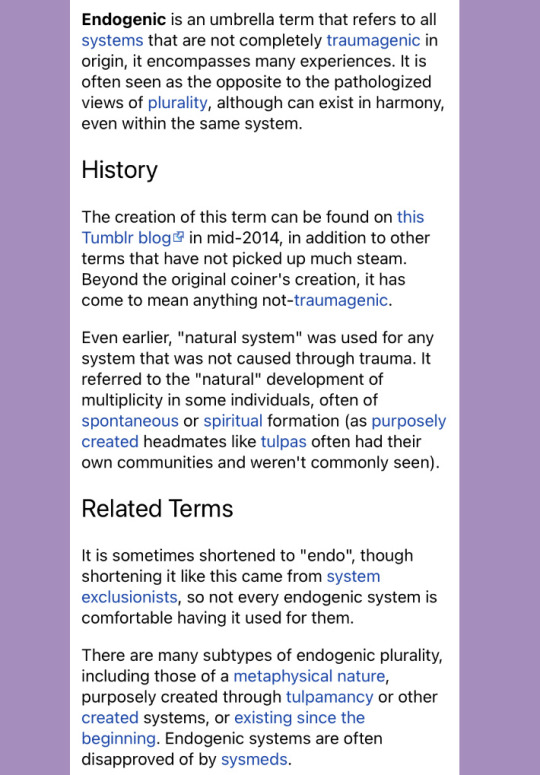
(alt text copied from the site:)
Endogenic is an umbrella term that refers to all systems that are not completely traumagenic in origin, it encompasses many experiences. It is often seen as the opposite to the pathologized views of plurality, although can exist in harmony, even within the same system.
History
The creation of this term can be found on this Tumblr blog in mid-2014, in addition to other terms that have not picked up much steam. Beyond the original coiner's creation, it has come to mean anything not-traumagenic.
Even earlier, "natural system" was used for any system that was not caused through trauma. It referred to the "natural" development of multiplicity in some individuals, often of spontaneous or spiritual formation (as purposely created headmates like tulpas often had their own communities and weren't commonly seen).
Related Terms
It is sometimes shortened to "endo", though shortening it like this came from system exclusionists, so not every endogenic system is comfortable having it used for them.
There are many subtypes of endogenic plurality, including those of a metaphysical nature, purposely created through tulpamancy or other created systems, or existing since the beginning. Endogenic systems are often disapproved of by sysmeds. (end alt text)
this is from the multiplicity and plurality wiki:
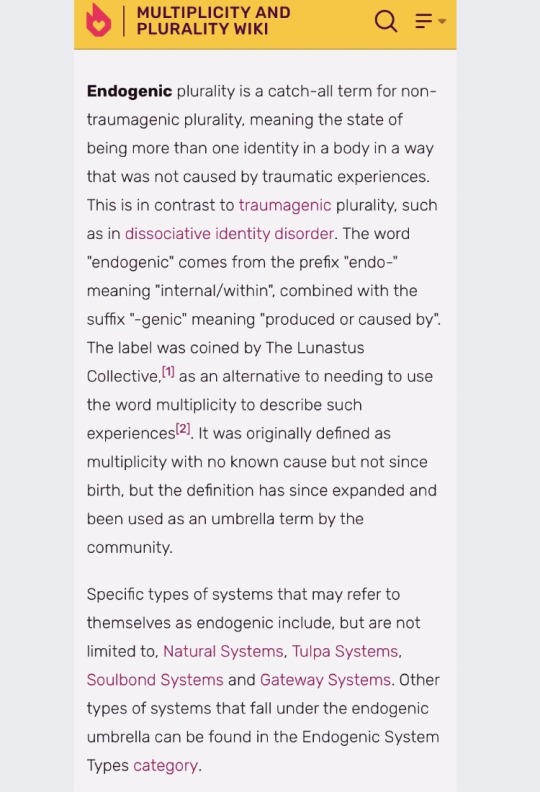
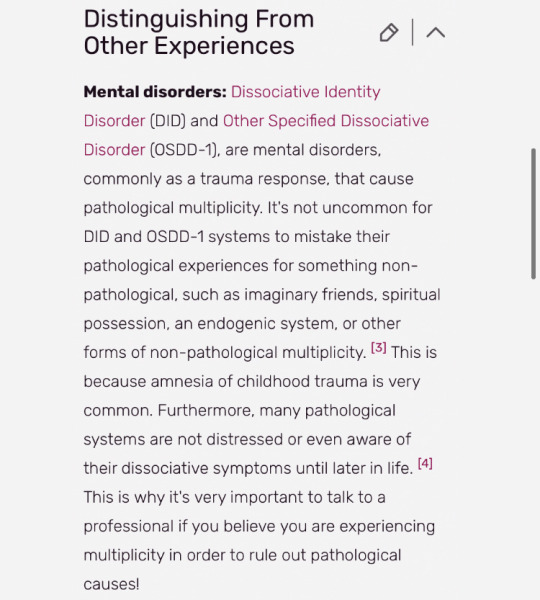
(alt text copied from the site for both images:)
Endogenic plurality is a catch-all term for non-traumagenic plurality, meaning the state of being more than one identity in a body in a way that was not caused by traumatic experiences. This is in contrast to traumagenic plurality, such as in dissociative identity disorder. The word "endogenic" comes from the prefix "endo-" meaning "internal/within", combined with the suffix "-genic" meaning "produced or caused by". The label was coined by The Lunastus Collective,[1] as an alternative to needing to use the word multiplicity to describe such experiences[2]. It was originally defined as multiplicity with no known cause but not since birth, but the definition has since expanded and been used as an umbrella term by the community.
Specific types of systems that may refer to themselves as endogenic include, but are not limited to, Natural Systems, Tulpa Systems, Soulbond Systems and Gateway Systems. Other types of systems that fall under the endogenic umbrella can be found in the Endogenic System Types category.
Distinguishing From Other Experiences
Mental disorders: Dissociative Identity Disorder (DID) and Other Specified Dissociative Disorder (OSDD-1), are mental disorders, commonly as a trauma response, that cause pathological multiplicity. It's not uncommon for DID and OSDD-1 systems to mistake their pathological experiences for something non-pathological, such as imaginary friends, spiritual possession, an endogenic system, or other forms of non-pathological multiplicity. [3] This is because amnesia of childhood trauma is very common. Furthermore, many pathological systems are not distressed or even aware of their dissociative symptoms until later in life. [4] This is why it's very important to talk to a professional if you believe you are experiencing multiplicity in order to rule out pathological causes! (end alt text)
you can search the term “endogenic” on our blog to see positivity posts made by members of our system on endogenic plurality in the past.
we hope this helps!
🐢 kip
6 notes
·
View notes